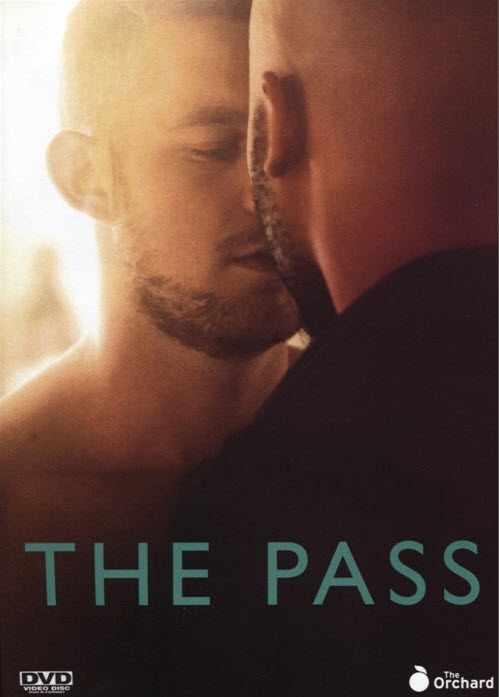(2018, 88 min)
Country: U.K.
Director: Ben A. Williams
Studio: Allied Vaughn
Language: English
SYNOPSIS: Jason and Ade are nineteen. They've been in the academy of a famous London soccer club since they were eight, and now it's the night before their first-ever game as professionals. They should being, but they're over-excited. They exercise, fight, laugh, and talk. And then, suddenly, Jason kisses Ade. In the high-profile sporting world where image is everything, this surprising pass sets the men up for a contrasting decade of fame and failure, full of secrets and denial.
REVIEW:
Adapted by John Donnelly from his own well-regarded play, this directorial debut from Ben A. Williams — collaborating here with veteran British producer Duncan Kenworthy (“Four Weddings and a Funeral,” “Notting Hill”) — provides a knockout showcase for Russell Tovey as Jason, an ambitious soccer player leading a life of denial at the expense of his former bond with plucky wannabe Ade (Arinze Kene). With the drama set entirely inside three different hotel rooms, its theatrical origins are difficult to disguise, but any attempt to broaden the scope purely to feel more notionally cinematic would surely have fatally deflated its claustrophobic chamber-piece tension. Its sincere grappling with issues of fame and sexuality lends a topical urgency to a generally absorbing indie that raises the curtain with appropriate flair on the Flare London LGBT Film Festival.
As “The Pass” opens in a Romanian hotel room the night before a big match, young Jason expresses his determination to get to the very top of his chosen field: Premiership football. His teammate Ade is no less keen, warning Jason that on the playing field in tomorrow’s crucial game, it’s every man for himself, as far as getting noticed by talent scouts goes. Jason apparently more than agrees — he’s prepared to extend his ambitious posturing to every area of his life, not just the pitch. Wearing only tight underwear and a mocking smile, Jason banters ambiguously with his rival, whose attempts to respond in kind are undercut by a sweet insistence on taking everything a little more sincerely than Jason.
“The Pass” hews as closely as anything ever made to a formal three-act structure, with five years passing between each of three self-contained chapters; Syd Field would surely approve. Jason’s ascendance in the interim is visible in the increasing grandeur of the hotel rooms, his status as a bird in a gilded cage (or indeed, gilded closet) well evinced in Peter Francis’ production design. The final-act suite is luxuriously appointed, but the room’s heavy curtains are closely drawn, the outside world barely figuring in a claustrophobic parallel with Jason’s repressed sexual energy; it’s a pent-up penthouse. Chris O’Driscoll’s camera makes continuous brave attempts to maintain a feeling of movement and motion despite the piece’s hemmed-in setting and theatrical origins, succeeding particularly when the characters are at their most boisterous and live-wire.
The film is largely a two-hander between Kene and Tovey in its first and final acts, but the middle stretch requires a different tone: Kene’s absence is felt as an undertow, but Lisa McGrillis provides a bright counterpoint as the tabloid honey trap who may or may not be taking Jason for a ride. Her reaction when she realizes what is going on is among the high points in a film notable for its performances.
It is the final third of the script that requires the greatest suspension of disbelief when realized as cinema, replete as it is with the sort of gambits (for example, holding one’s breath under water or indeed under alcohol) that appear to have a plausible element of danger when enacted live on stage and can therefore distract a theater audience from the overall believability – or not – of the character’s decision-making in the scene. Nevertheless, the third act has a manic quality to its energy so pointedly different to the puppyish tumbling and nipping of the first scene that the sense of contrast with what came before more or less powers us through.
The role of Jason, which Tovey originated on stage, inspires the kind of high-octane dramatic performance that should see the likable actor wrest more mainstream work from casting agents in the U.S. as well as Blighty, particularly at a time when so many of England’s best young actors represent the more privileged end of the social spectrum. Born in Billericay, Essex, to parents who run a Romford-based coach company, Tovey, with his state-school background, is a world away from Eton-educated contemporaries like Eddie Redmayne and Tom Hiddleston, an off-screen narrative that lends a little piquancy to his character’s determined social-climbing efforts.
Pic benefits from detailed work in the makeup and costume departments (from Holly Smart, Ann Fenton and Issy Webley). When we first meet them, the boys boast perfectly hairless chests and peachy beardless chins, with Tovey gamely sporting the sort of twinky peroxide bleach job to which soccer players are so lamentably susceptible in the absence of a stylist. Our final check-in with the lads sees Kene bearded, with subtle chest hair, while Tovey’s scruffy stubble and hollow-eyed pallor chimes with Jason’s accounts of working out at midnight, driven by energy drinks and pills, barely leaving his hotel room, his personal life delivered to his room to order. These are not complex changes from a technical point of view; the intelligence lies in their restraint, in giving the performers the space to shade in the impression of time having passed, unencumbered by over-the-top aging makeup.
Echoing the central dilemma of the film itself, the marketing faces the presumed conundrum that an audience of conventional soccer fans are unlikely to want to see a film about a star player wrestling with his sexual identity, whereas a modern LGBT crowd might not be wholly sympathetic to Jason’s calculated, self-loathing decisions. In reality, the film is not about soccer per se — Jason’s concerns translate easily into other high-profile public roles, while the themes of tension between a public and private self extend beyond LGBT auds. “The Pass” is nevertheless unlikely to score premiership fees, and a broad rollout would likely rep its own goal, but a modest distribution strategy focused on VOD and targeting audiences for the original play could keep it from being relegated to the leagues of the unseen faced by so many minor fest films.
-- Review by Catherine Bray, Variety (https://variety.com)




